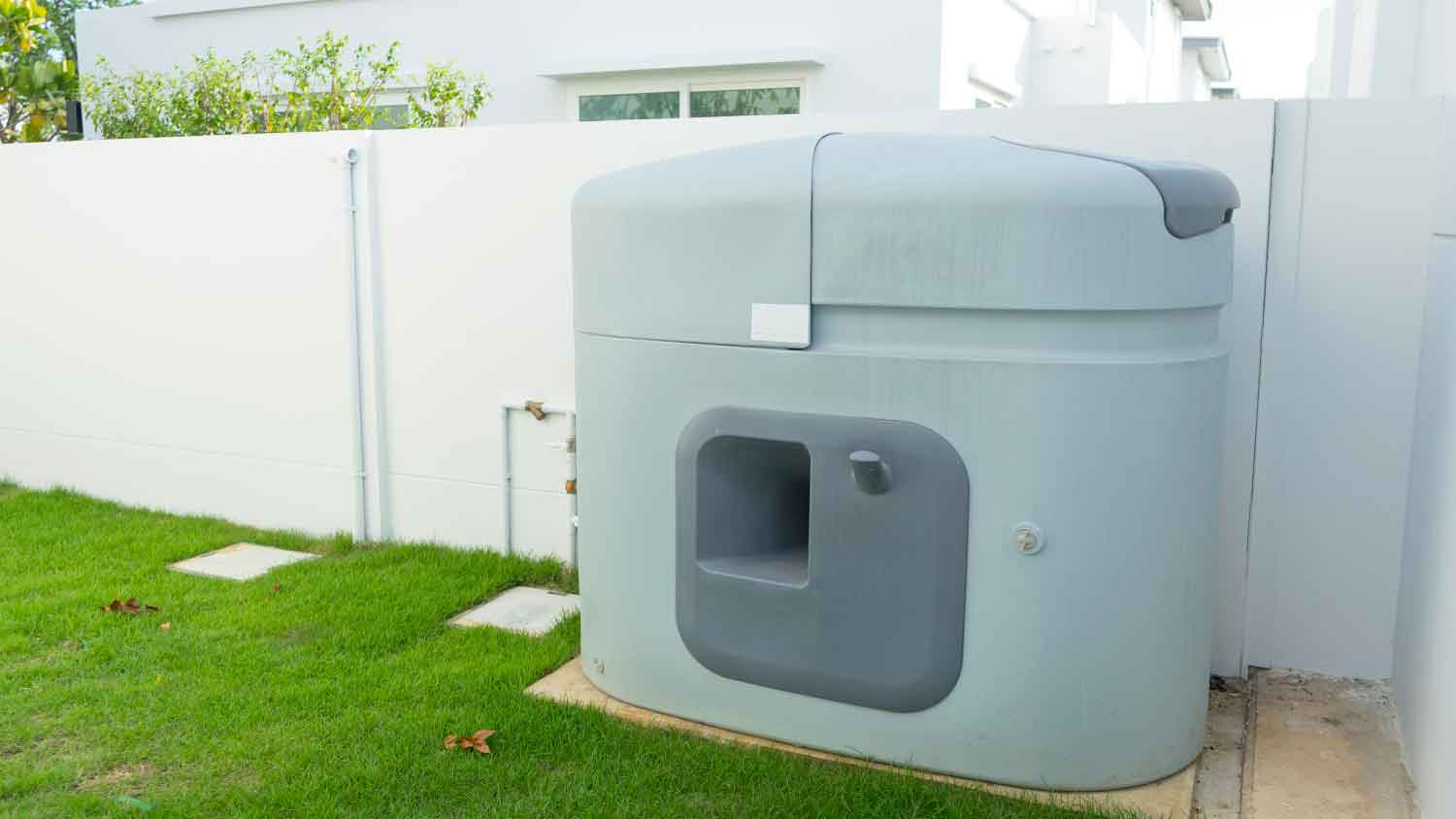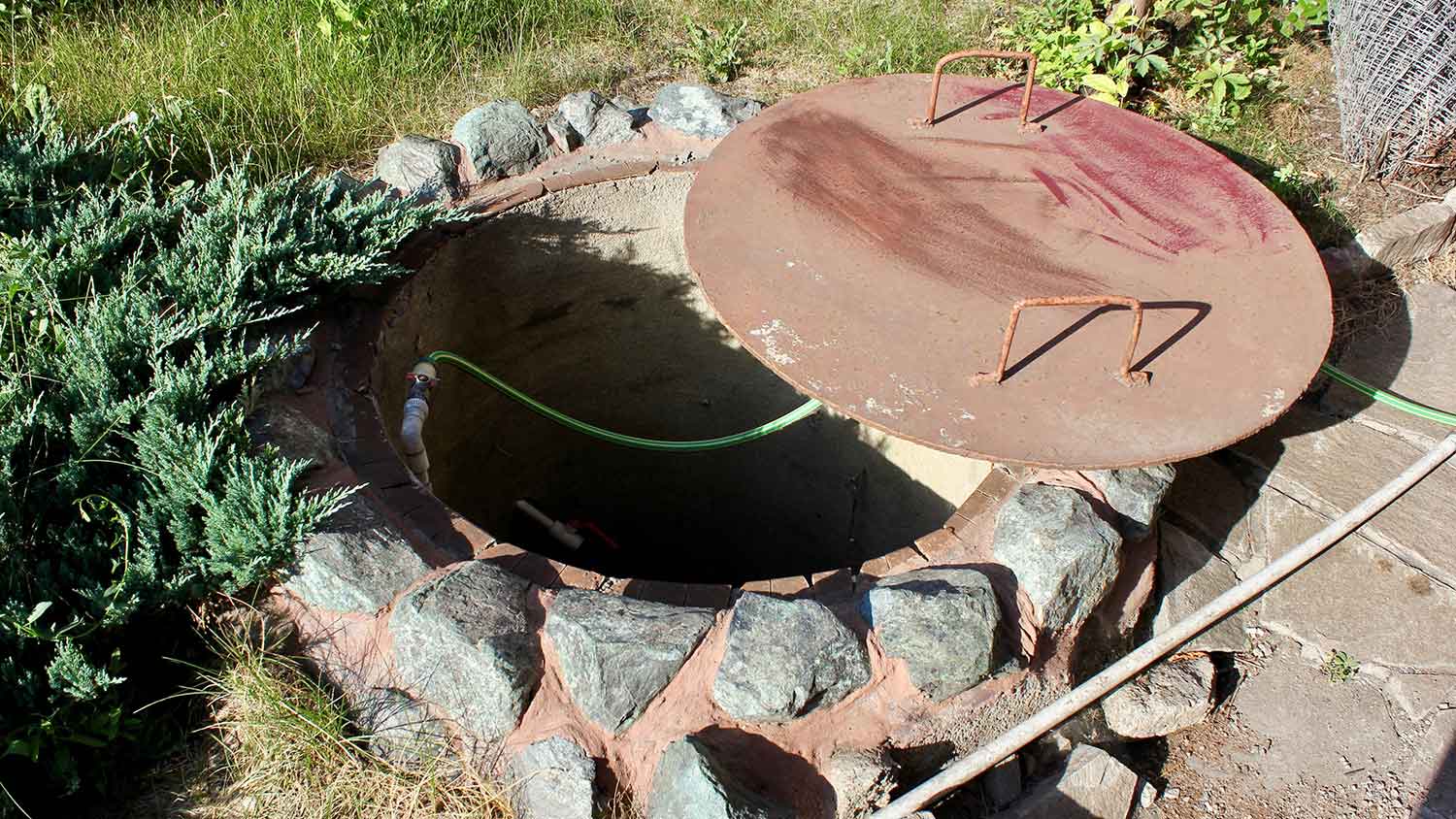Cistern vs. Well: Understanding Your Home Water System Options
Dig deep into the differences between water system


A well is a groundwater supply system, while a cistern is a water storage system that’s usually filled with rainwater.
Both wells and cisterns can offer a clean and reliable private water source.
Water access, water quality, personal preference, and cost are factors in whether a well or cistern is the best fit for your home.
Wells and cisterns can be used together as a water source and storage system.
Whether you’re building a new home or upgrading your current water system, you may be wondering whether a well or a cistern is the best fit for your new water supply. Both can be a great way to access water without relying on a municipal supply, and both are popular as a water solutions for rural homes. Explore more about the differences between these two systems, the advantages of each, and how to choose one (or both) for your home.
Cisterns vs. Wells: What’s the Difference?

The main difference between cisterns and wells is that wells provide water, whereas cisterns are a water storage system.
What Is a Well?
A well is a groundwater system where a deep hole is excavated to tap into an underground water supply. Wells often access natural springs or aquifers, which are porous rock systems that hold water underground. A pump then moves this well water up your well system so you can conveniently access it from your house.
What Is a Cistern?
Cisterns are large containers that allow you to store water and pump it into your home. Cisterns can be above or below ground and come in a variety of sizes, depending on your storage needs.
Since they don’t directly access a water source, you’ll need to fill the cistern yourself. Many people have a rainwater collection system to fill the cistern, while others may fill it from a well or even a municipal water source.
| Wells | Cisterns |
|---|---|
| Water source | Water storage |
| Uses groundwater | Stores rainwater or well water |
| Costs depend on well depth | Costs depend on cistern size |
| Needs chlorination twice per year | Need cleaning twice per year |
| Lasts 25+ years | Lasts 20–30 years |
Pros and Cons: Wells and Cisterns vs. City Water
If you live near a municipal water source, you may be weighing the pros and cons of city water compared to installing your own private supply using a well or cistern. Take a look at a few advantages and disadvantages of choosing a well or cistern over accessing city water.
Pro: Independent Water Supply
Depending on where you live, it can be costly or inconvenient to access a municipal water supply. Many people who live in rural areas choose a well or cistern because it allows them to access water on their own private land.
You’ll also have a safety net from water restrictions or from anything that may impact the municipal supply. In the case of flooding, earthquakes, or public sewer backups, the municipal water supply can be impacted for days at a time. Except for extreme weather events, private wells and cisterns tend to be shielded from the issues that can affect city water.
Pro: Eco-Friendly Water Access
Municipal water often goes through extensive water treatment, which takes a lot of energy and resources. Accessing well water or rainwater through a cistern doesn’t require the same treatment, as these sources are usually very clean (though it’s always a good idea to get your well water tested just to make sure).
Con: Maintaining It Yourself
Having your own water access puts you in control, but it also requires maintenance to keep it fresh and clean. If your well or cistern pump breaks, it’s up to you to replace it.
The average cost of replacing a well pump is $1,850, with well pump repair costs running from $370 to $1,600.
You should test your well water at least once a year, and costs between $50 to $150 for home kits or $100 to $650 to bring in a professional.
In comparison, municipal water access costs about $35 a month, though this can vary dramatically depending on your municipality and whether you live in a rural or urban area.
Con: Reliant on Electricity
Wells and most cisterns use a well pump and motor system to move water from the source to your home. This means that if there’s a power outage, you’ll also lose water access because your pump can no longer run.
If you live in an area prone to power loss, it’s a good idea to have a secondary power source like a backup generator or solar panel and battery to keep your water flowing smoothly.
Wells vs. Cisterns: Choosing the Best Fit for Your Home

If you’re looking for an eco-friendly, private water supply option, a well or cistern is probably for you. However, choosing between the two can be confusing.
Where you live is a major factor in choosing whether a well or cistern is a better water source for your home. Your location can impact things like installation cost, system feasibility, and even the taste and smell of your well water. It’s a good idea to examine this and the other factors below before making your decision. Or consider consulting with a well pump contractor near you to get a professional opinion on the costs and advantages of water systems in your area.
Location
Some regions have groundwater that’s readily accessible through a well, while others require very deep (and therefore expensive) excavations to tap into water. The cost to drill a well depends largely on the depth, so it’s a good idea to check common well depths in your area as a first step in your decision-making process.
The most common water source for cisterns is rainwater, so rainfall levels will dramatically impact the efficiency of your cistern. This doesn’t mean it needs to rain constantly—if you have a large enough cistern, you can store water through long periods of drought.
Comparing groundwater access to average rainfall in your area can be a good place to start when choosing between a well or cistern.
Local Water Quality
Not all groundwater is made equal—some well water is rich in natural, healthy minerals, whereas other areas are vulnerable to groundwater contamination. It’s important to get the water tested when you’re considering where to drill a well.
However, even if you do find some minor contaminants, this isn’t necessarily a dealbreaker. A well expert can tell you what kind of filtration system you might need so you can assess whether it would still be a cost-effective system for your home.
In contrast, rainwater is typically free from major contaminants unless you live in an area with higher levels of air pollution since rain may pick this up as it falls. Like well water, a filtration system can make cistern water drinkable, but it’s a good idea to do a cost comparison to determine the level of filtration you’ll need.
Taste and Smell
Not all well water has a distinctive taste and smell—this will depend on your local minerals and your filtration system. Taste and smell aren’t necessarily a bad thing either, but they may affect your decision if you’re using well water as drinking water.
Some people prefer mineral-rich well water and may find that it has a sweet or pleasant taste. Cistern rainwater doesn’t usually have minerals, taste, or smell, so if you’re looking for a milder experience then you may prefer a cistern over a well.
Well vs. Cistern Cost
In most cases, a well has a lower initial cost than a rainwater cistern system. This isn’t always the case—wells can get expensive if they’re really deep.
Other cost factors to consider include:
Life span: Cisterns last 20–30 years, whereas wells last 25 years.
Maintenance: Cisterns should be cleaned twice a year (usually costing about $650), whereas wells should be chlorinated twice a year (costing about $150).
Filtration: Whether a well or cistern filtration system is more costly will depend on the groundwater and rainwater quality where you live.
Can You Have a Cistern and a Well?
There’s no right or wrong choice between wells and cisterns—both offer a great private water source for your home. The biggest decision-making factor is location, as groundwater access, rainfall, and local contaminants will impact your clean water access and cost.
However, it’s not always about choosing just one. Sometimes the best option is a mixture of both! A cistern is a flexible water storage system, meaning that rainwater isn’t the only good water supply. Some people choose to pump well water into a cistern as a storage system for seasonal wells or to use well water as a backup during the dry season.





- What Is a Cistern Hole? The Basics You Need to Know
- How To Make Cistern Water Drinkable: What Homeowners Need To Know
- How To Install and Build a Cistern for Your Home
- What Is Well Water? Everything You Need To Know
- What's the Difference Between Well Water and City Water?
- How to Choose a Water Line Size From Your Well to Your House
- Common Well Pump Problems and How To Fix Them
- What Does Water Damage Look Like? Key Warning Signs
- 9 Tips to Help Increase the Water Pressure in Your House
- What’s the Difference Between Hard Water and Soft Water?










